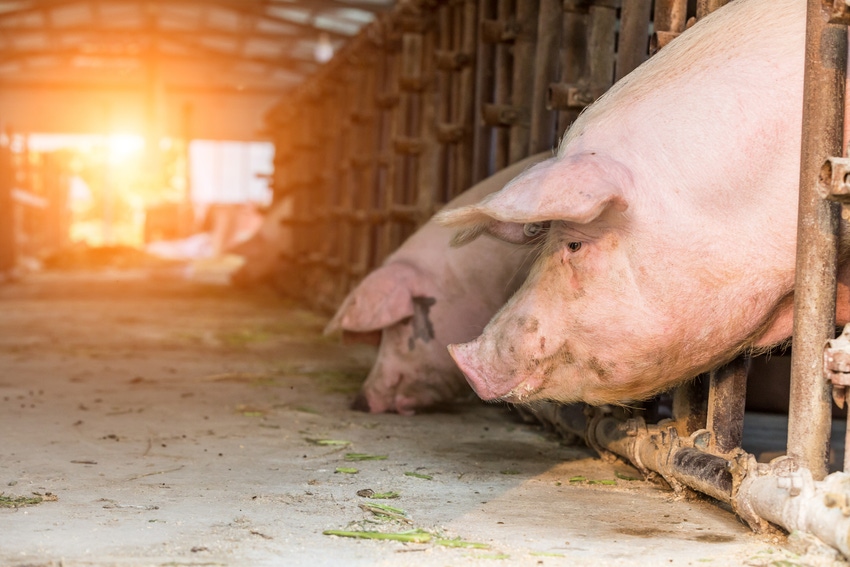China seeks to ease pig transport ban amid ASF outbreak
China to loosen movement restrictions on breeding swine to ensure pig production and pork supplies; however, new outbreaks continue to be detected in southern China.

China announced Dec. 26 that it will loosen rules on the transportation of breeder pigs and piglets in provinces affected by African swine fever (ASF), according to a Reuters report.
Reuters said China's Ministry of Agriculture & Rural Affairs reported on its website that the change was put in place to ensure pig production and pork supplies. To date, national officials in Beijing, China, have officially reported more than 90 ASF cases since August, Reuters noted.
Breeder pigs and piglets from counties without ASF outbreaks will be allowed to be transported to other provinces, the ministry said, and breeder pigs and piglets from infected counties will be allowed to be moved within the infected province.
Reuters also reported that the ministry determined that market pigs produced at farms with high biosecurity levels in infected counties can also be targeted -- either sold to slaughterhouses with 150,000 pigs per year or above slaughtering capacity in the province.
China had previously banned the transport of live pigs from regions infected with the disease, leading to a steep drop in prices in major production areas in northern China that usually sell pigs to other regions, Reuters said.
This is not China's first effort to lift movement restrictions. Chana's state-run Xinhua news service reported Dec. 18 that authorities lifted ASF quarantines in three more areas as prevention and control measures have "put outbreaks under control."
Laboratory tests and on-site assessments by local authorities show that the epidemic has been eliminated in the counties of Taoyuan and Yuanling in central Hunan province and Taiyuan in northern Shanxi province, Xinhua reported the Ministry of Agriculture & Rural Affairs declaring Dec. 25.
No new cases have been reported at the three infected areas over the past six weeks, as immediate actions have been taken to block, cull and disinfect affected pigs after the outbreak, officials said.
Xinhua also reported that the ministry has demanded that local governments step up monitoring of pigs and take proactive measures to prevent a recurrence of the disease.
Xinhua's Dec. 25 report noted that the situation has started to improve, and restrictions have been lifted in about 38 affected areas.
Meanwhile, the Epoch Times reported Dec. 25 that ASF has spread to several provinces in southern China, with severe and swift outbreaks leading to the culling of scores of pigs.
The virus has now spread to Guangzhou City in Guangdong province, the southernmost province on the mainland.
Epoch Times cited a Dec. 25 article by Hong Kong media Apple Daily reporting that local authorities in Guangzhou culled more than 6,000 pigs at a farm in Huangpu District after local authorities temporarily put the owner of the farm and her dozen employees under house arrest at an unknown hotel. They were presumably detained to prevent the case from being publicly revealed.
According to Apple Daily, the latest case in Guangzhou places the number of Chinese provinces, municipalities and regions with known ASF cases at 23, with a total of 101 reported cases, Epoch Times reported.
Lai Shiow-suey, emeritus professor at the School of Veterinary Medicine at Taiwan’s National Taiwan University, said China could be underreporting the number of outbreak cases, given that there are roughly 430 million pigs in China. According to his estimation, the possible number of pigs infected could be well over 100 million, he told the Liberty Times newspaper on Dec. 22, according to Epoch Times.
Lai added that China had made a mistake by buying pork imports from Russia instead of buying from the U.S. — due to self-imposed tariffs enacted amid the China-U.S. trade war. He explained that the genetic sequence of the virus found in infected pigs in Shenyang City — the capital of northern China’s Liaoning province, where China’s first ASF case was reported — was nearly identical to those found in Russia and Poland, Epoch Times said.
About the Author(s)
You May Also Like



